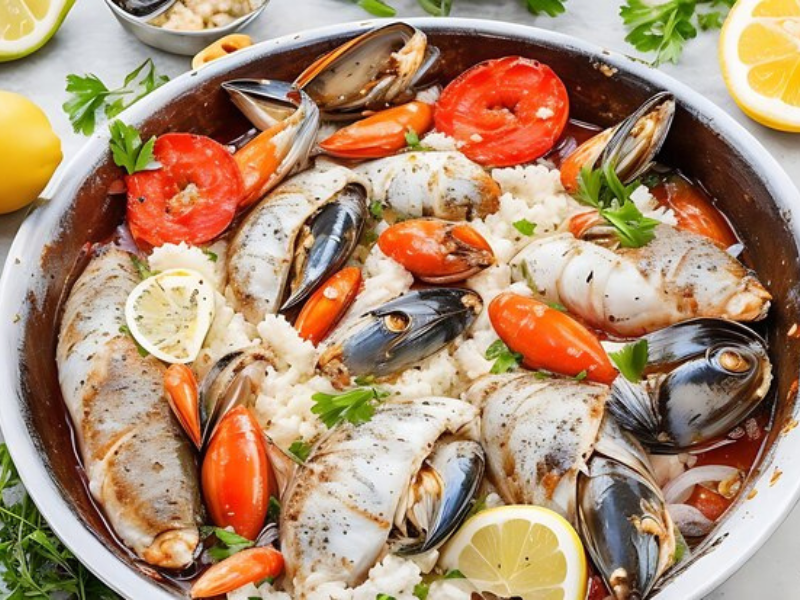Greek Gastronomy: The Foodie’s Guide to Dining in Greece
When it comes to culinary delights, Greece is a food lover’s paradise. With its rich history, diverse landscapes, and vibrant culture, this Mediterranean gem offers a unique dining experience that is sure to satisfy even the most discerning palate. From traditional dishes and local specialties to modern twists on classic recipes, there is something for everyone to enjoy in Greece’s gastronomic scene.
In this comprehensive guide, we will take you on a culinary journey through the best dining spots in Greece, exploring the traditional flavors, local ingredients, and cultural influences that make Greek cuisine so unique. So, grab your forks and get ready to embark on a foodie adventure like no other!
1. Traditional Greek Cuisine
Greek cuisine is renowned for its delicious flavors, fresh ingredients, and simple yet wholesome dishes. With a focus on fresh vegetables, olive oil, herbs, and seafood, Greek food is both healthy and delicious. Some must-try traditional dishes include moussaka, souvlaki, gyro, spanakopita, and baklava. These dishes showcase the best of Greek culinary traditions and are sure to leave you craving for more.
2. Local specialties
Each region of Greece has its own unique culinary specialties, influenced by the local climate, geography, and traditions. In Crete, you can savor the famous Cretan diet, which includes dishes like dakos, kalitsounia, and tsikoudia. In the Peloponnese, you can indulge in traditional dishes like pastitsio, pork gyros, and kalamata olives. And in the Aegean Islands, you can sample fresh seafood, grilled octopus, and fava bean puree. No matter where you go in Greece, you are sure to find a wealth of culinary delights waiting to be explored.
3. Greek Meze
One of the best ways to experience Greek cuisine is through meze, a selection of small dishes served as appetizers or main courses. Meze is perfect for sharing with friends and family, allowing you to sample a variety of flavors and textures in one meal. Some popular meze dishes include tzatziki, taramasalata, dolmades, keftedes, and saganaki. Pair your meze with a glass of ouzo or tsipouro, and you have the perfect Greek dining experience.
4. Michelin-starred Restaurants in Greece
For those looking for a more upscale dining experience, Greece offers a number of Michelin-starred restaurants that showcase the country’s culinary excellence. From Athens to Mykonos, you can indulge in innovative dishes prepared by top chefs using the finest local ingredients. Some notable Michelin-starred restaurants in Greece include Funky Gourmet, Spondi, and Hytra in Athens, and Mazi and Gourounakia in Mykonos. These restaurants offer a blend of traditional and modern Greek cuisine, providing a truly unforgettable dining experience.
5. Greek Street Food
When it comes to street food, Greece is a paradise for foodies. From souvlaki and gyros to koulouri and loukoumades, Greek street food is both delicious and affordable. You can find street food vendors throughout Greece, serving up fresh and tasty snacks that are perfect for on-the-go dining. Whether you are exploring the bustling streets of Athens or relaxing on a sunny beach in Santorini, Greek street food is a must-try for any food lover.
6. Cooking Classes in Greece
For those who want to immerse themselves in Greek cuisine, taking a cooking class is a great way to learn the secrets of traditional Greek dishes. Many restaurants and cooking schools in Greece offer hands-on cooking classes that teach you how to prepare classic dishes like moussaka, dolmades, and baklava. You can also visit local markets, learn about Greek ingredients, and dine on the delicious dishes you have prepared. Cooking classes in Greece are a fun and interactive way to experience the country’s culinary culture.
7. Wine Tasting in Greece
No Greek meal is complete without a glass of wine. Greece is home to many vineyards and wineries that produce a wide variety of wines, from crisp whites and rosés to full-bodied reds. Some popular Greek wine regions include Santorini, Nemea, and Drama, each known for its unique terroir and grape varieties. You can visit local wineries, participate in wine tastings, and learn about the history of winemaking in Greece. Whether you are a wine connoisseur or a casual drinker, Greek wine is sure to delight your taste buds.

8. Seafood in Greece
With its long coastline and abundance of fresh seafood, Greece is a paradise for seafood lovers. From grilled octopus and fried calamari to baked fish and seafood risotto, there is no shortage of delicious seafood dishes to enjoy. You can dine at seaside tavernas, where you can savor the catch of the day while enjoying stunning views of the Mediterranean Sea. Fresh, flavorful, and cooked to perfection, Greek seafood is a must-try for anyone visiting Greece.
9. Vegetarian and Vegan Options
For those following a vegetarian or vegan diet, Greece offers a wealth of plant-based options that are both delicious and nutritious. Traditional Greek cuisine is naturally vegetarian-friendly, with many dishes featuring fresh vegetables, legumes, and grains. Some popular vegetarian and vegan dishes in Greece include fasolada (bean soup), gigantes (giant beans in tomato sauce), and gemista (stuffed vegetables). You can also find vegan versions of traditional Greek dishes at many restaurants and cafes throughout the country.
10. Food Markets in Greece
One of the best ways to experience the vibrant food culture of Greece is by visiting a local food market. From bustling street markets to quaint village markets, Greece is home to a variety of markets where you can sample and purchase the freshest local produce, meats, cheeses, and baked goods. Some popular food markets in Greece include Central Market in Athens, Varvakios Agora in Thessaloniki, and Kapani Market in Chania. These markets offer a sensory feast of sights, sounds, and smells that will immerse you in the rich culinary tradition of Greece.
11. Desserts and Sweets
No Greek meal is complete without a sweet treat to finish. Greek desserts are known for their rich flavors, creamy textures, and decadent ingredients. Some popular Greek desserts include baklava (layers of phyllo dough filled with nuts and syrup), galaktoboureko (custard-filled pastry), loukoumades (deep-fried dough balls drizzled with honey and cinnamon), and kataifi (shredded phyllo dough pastry with nuts and syrup). Whether you have a sweet tooth or not, Greek desserts are sure to leave you satisfied and craving for more.
12. Street Markets in Greece
For those looking to experience the local cuisine and culture of Greece, street markets are a must-visit. These bustling markets offer a variety of fresh produce, meats, cheeses, and spices that are perfect for sampling and purchasing. You can wander through the stalls, chat with local vendors, and discover the flavors and aromas of Greek cuisine. Some popular street markets in Greece include Monastiraki Flea Market in Athens, Municipal Market of Chania in Crete, and Modiano Market in Thessaloniki. Whether you are looking for ingredients to cook with or souvenirs to take home, street markets in Greece are a feast for the senses.
13. Food Festivals and Events
Throughout the year, Greece hosts a variety of food festivals and events that celebrate the country’s culinary heritage. From olive oil festivals and wine tastings to seafood festivals and street food fairs, there is always something delicious happening in Greece. Some popular food festivals in Greece include the Athens Street Food Festival, the Cheese Festival in Naxos, and the Gastronomic Festival in Thessaloniki. These events are a great way to discover new flavors, meet local producers, and immerse yourself in the vibrant food scene of Greece.
14. Hidden Gems and Local Favorites
While Greece is home to many popular dining spots and tourist-friendly restaurants, there are also hidden gems and local favorites that offer a more authentic and intimate dining experience. These off-the-beaten-path eateries may not have Michelin stars or fancy decor, but they more than make up for it with delicious food, warm hospitality, and a genuine love for Greek cuisine. Whether you stumble upon a tiny taverna in a remote village or a family-run bakery in an ancient city, these hidden gems are the true heart and soul of Greek gastronomy.
15. Food and Culture
In Greece, food is more than just sustenance – it is a reflection of the country’s rich history, diverse culture, and vibrant traditions. From ancient Greek feasts and Byzantine banquets to Ottoman influences and modern innovations, Greek cuisine is a melting pot of flavors and influences that tell a story of the country’s culinary evolution. By dining in Greece, you can immerse yourself in this culinary tapestry, exploring the flavors, aromas, and textures that make Greek cuisine so unique. So, as you savor each bite and sip, remember that you are not just dining in Greece – you are tasting the very essence of a country rich in food and culture. Bon appétit!
FAQs about “Greek Gastronomy: The Foodie’s Guide to Dining in Greece”
- What distinguishes “Greek Gastronomy: The Foodie’s Guide to Dining in Greece” from other guides to Greek cuisine? This guide is tailored specifically for food enthusiasts, offering comprehensive insights into dining experiences, culinary traditions, and regional specialties across Greece.
- Which aspects of Greek gastronomy are covered in this guide? “Greek Gastronomy” covers a wide range of aspects, including traditional dishes, local ingredients, cooking techniques, dining customs, and the cultural significance of food in Greek society.
- Are specific Greek dishes and dining destinations featured in this guide? Yes, this guide features a curated selection of Greek dishes and dining destinations that exemplify the diversity and richness of Greek gastronomy. From tavernas in Athens to seaside restaurants in Santorini, readers will discover the best places to experience authentic Greek cuisine.
- How does this guide cater to different types of travelers, from food enthusiasts to casual diners? This guide caters to different types of travelers by offering a variety of dining recommendations, from fine dining experiences to casual eateries and street food vendors. It also provides insights into vegetarian, vegan, and gluten-free options, ensuring that all travelers can enjoy Greek cuisine.
- Can readers expect to gain practical advice for planning their culinary adventures in Greece from this guide? Absolutely! “Greek Gastronomy” provides readers with practical advice, insider tips, and culinary insights to help them plan unforgettable dining experiences in Greece. Whether you’re a food enthusiast seeking authentic flavors or a casual diner looking for delicious meals, this guide has something for everyone.
Advantages:
- Appeal to Food Enthusiasts: The title “Greek Gastronomy: The Foodie’s Guide to Dining in Greece” immediately appeals to food enthusiasts, indicating that the content will cater to individuals passionate about culinary experiences.
- Comprehensive Coverage: By positioning itself as a guide, the title suggests comprehensive coverage of Greek gastronomy, promising to provide readers with detailed insights into dining options across Greece.
- Cultural Exploration: The title implies exploration of Greek culinary traditions and culture, offering readers the opportunity to learn about the rich history and heritage behind Greek cuisine.
- Practicality: As a guide, the title serves a practical purpose for travelers, providing them with valuable recommendations and tips for dining in Greece, including information on local specialties, dining etiquette, and must-visit restaurants.
- Inspiration for Travel: The title may inspire readers to plan trips to Greece to experience its culinary delights firsthand, encouraging them to immerse themselves in the vibrant food scene of the country.
Disadvantages:
- Oversimplification: While the title suggests a comprehensive guide, it may oversimplify the diversity of Greek cuisine and dining experiences, potentially overlooking regional variations and lesser-known culinary gems.
- Subjectivity: Recommendations in the guide may be subjective and may not align with every reader’s tastes and preferences, potentially leading to disappointment if the suggested dining experiences do not meet their expectations.
- Accessibility: The guide may not cater to all budgets or travel styles, potentially limiting its relevance for readers seeking budget-friendly or off-the-beaten-path dining options in Greece.
- Cultural Appropriation Concerns: Without proper context and understanding, promoting Greek gastronomy may risk perpetuating stereotypes or appropriating Greek culinary traditions without respect for their cultural significance.
- Commercial Bias: Depending on the source of the guide, there may be a commercial bias towards certain restaurants or establishments, potentially compromising the objectivity and reliability of the recommendations provided.
















